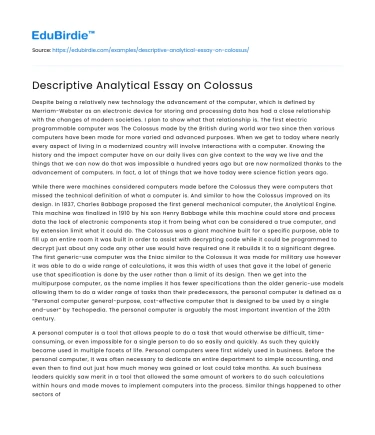Despite being a relatively new technology the advancement of the computer, which is defined by Merriam-Webster as an electronic device for storing and processing data has had a close relationship with the changes of modern societies. I plan to show what that relationship is. The first electric programmable computer was The Colossus made by the British during world war two since then various computers have been made for more varied and advanced purposes. When we get to today where nearly every aspect of living in a modernized country will involve interactions with a computer. Knowing the history and the impact computer have on our daily lives can give context to the way we live and the things that we can now do that was impossible a hundred years ago but are now normalized thanks to the advancement of computers. In fact, a lot of things that we have today were science fiction years ago.
While there were machines considered computers made before the Colossus they were computers that missed the technical definition of what a computer is. And similar to how the Colossus improved on its design. In 1837, Charles Babbage proposed the first general mechanical computer, the Analytical Engine. This machine was finalized in 1910 by his son Henry Babbage while this machine could store and process data the lack of electronic components stop it from being what can be considered a true computer, and by extension limit what it could do. The Colossus was a giant machine built for a specific purpose, able to fill up an entire room it was built in order to assist with decrypting code while it could be programmed to decrypt just about any code any other use would have required one it rebuilds it to a significant degree. The first generic-use computer was the Eniac similar to the Colossus it was made for military use however it was able to do a wide range of calculations, it was this width of uses that gave it the label of generic use that specification is done by the user rather than a limit of its design. Then we get into the multipurpose computer, as the name implies it has fewer specifications than the older generic-use models allowing them to do a wider range of tasks than their predecessors, the personal computer is defined as a “Personal computer general-purpose, cost-effective computer that is designed to be used by a single end-user” by Techopedia. The personal computer is arguably the most important invention of the 20th century.
Save your time!
We can take care of your essay
- Proper editing and formatting
- Free revision, title page, and bibliography
- Flexible prices and money-back guarantee
A personal computer is a tool that allows people to do a task that would otherwise be difficult, time-consuming, or even impossible for a single person to do so easily and quickly. As such they quickly became used in multiple facets of life. Personal computers were first widely used in business. Before the personal computer, it was often necessary to dedicate an entire department to simple accounting, and even then to find out just how much money was gained or lost could take months. As such business leaders quickly saw merit in a tool that allowed the same amount of workers to do such calculations within hours and made moves to implement computers into the process. Similar things happened to other sectors of businesses in a process called automation that the computer was the backbone. This made processes much more efficient and despite a high initial cost cheaper in the long term. After seeing the effectiveness of computers at their workplaces many people found themselves wanting their own at home. A survey of the US pc market revealed that by the end of the 80s, nearly 10% of all households owned a personal computer, by the end of the 90s 40%, ten years after that nearly 60, and when you get to 2016 80% of households on these United States have a PC in one form or another. In fact, I would bet that everyone here who wrote an essay did so through the use of a PC, as the increased prevalence of their use had pushed older technologies such as the typewriter towards obscurity. When a single tool can do a task another is specialized in yet does the task better while also keeping a myriad of other uses, owning the specialized tool become moot.
As technology improved the uses of the PC expanded further as the cost diminished. This has strongly affected their sway in our daily lives. Statistica a website for collecting statistics from more than 22,500 sources lists that in 2020 it is projected that nearly 3 billion people worldwide will own a smartphone. Due to Moore’s law an observation of the fact that the number of transistors in densely integrated circuits doubles about every two years, computers are becoming exponentially powerful more powerful. That means that nearly every one of those phones will be exponentially more powerful than the most powerful desktop computers that were on the market 10 years ago despite taking up a fraction of the space, similar to how those were much more powerful than the Eniac despite that taking up an entire room. And it’s not only in the realm of personal use that this is true, but both traffic control and the systems that try to keep trains running on time in major cities also use computers for that purpose, NYC for example 7,650 intersections are connected to a centralized network, the subway has a similar network which is why you can now see timers based on the distance a train is from your station in many stations the network is relaying this information.
- https://www.cryptomuseum.com/crypto/colossus/index.htm
- https://www.intel.com/content/www/us/en/silicon-innovations/moores-law-technology.html
- https://www.computerhistory.org/revolution/birth-of-the-computer/4/78
- https://singularityhub.com/2016/03/22/technology-feels-like-its-accelerating-because-it-actually-is/
- https://www.statista.com/statistics/330695/number-of-smartphone-users-worldwide/
- https://www.merriam-webster.com/dictionary/computer
- https://www.britannica.com/technology/Analytical-Engine
- http://people.bu.edu/baws/brief%20computer%20history.html
- https://www.livescience.com/20718-computer-history.html






 Stuck on your essay?
Stuck on your essay?

